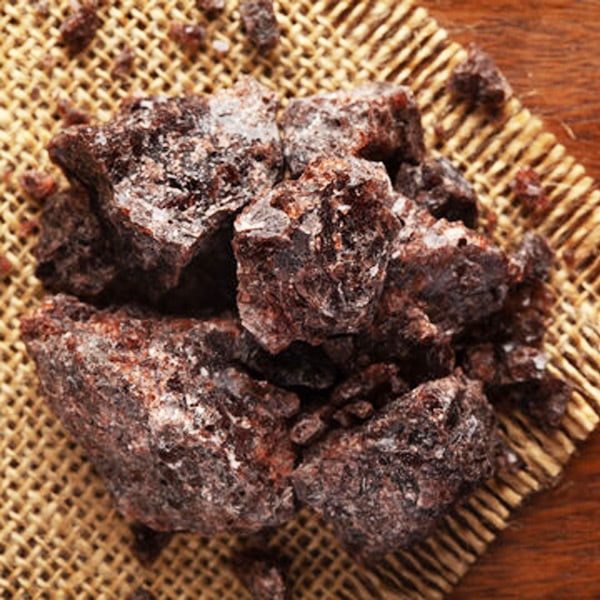Blog
What is the use of black salt in Ayurveda?

In Ayurveda, the ancient Indian system of medicine, black salt, particularly Kala Namak, transcends its culinary applications. It’s viewed as a valuable medicinal tool with the potential to address various health concerns. Let’s delve deeper into the world of black salt in Ayurveda, exploring its purported benefits, traditional uses, and the underlying principles that guide its application.
The Ayurvedic Perspective on Black Salt:
Ayurveda categorizes substances based on their inherent qualities (gunas) and energetic effects (doshas). Black salt, with its volcanic origins and unique mineral composition, is considered to possess a cooling virya (potency). This cooling nature is believed to balance Pitta dosha, the fiery principle associated with metabolism, digestion, and body temperature. Individuals with an aggravated Pitta dosha might experience symptoms like heartburn, acidity, and excessive heat in the body. Black salt, with its cooling properties, is believed to offer relief from these discomforts.
Purported Benefits in Ayurveda:
-
Digestive Aid: Ayurveda emphasizes the importance of proper digestion for overall well-being. Black salt is believed to stimulate digestive fire (agni) and aid in the breakdown of food. Its presence of sodium bicarbonate (baking soda) might further contribute to its potential role in neutralizing stomach acid and soothing indigestion.
-
Detoxification and Cleansing: Ayurvedic practices often incorporate cleansing methods to eliminate toxins (ama) from the body. Black salt, with its Rechana (laxative) properties, is believed to help cleanse the digestive system and promote regularity. However, it’s important to note that this use requires guidance from an Ayurvedic practitioner.
-
Electrolyte Balance: Black salt is a natural source of electrolytes like sodium, potassium, and magnesium. These minerals play a crucial role in maintaining proper hydration and muscle function. In Ayurveda, electrolyte imbalance can contribute to fatigue and sluggishness. Black salt, in moderation, might help replenish electrolytes and promote overall well-being.
Traditional Uses and Considerations:
-
Dietary Inclusion: Black salt is often incorporated into Ayurvedic diets for individuals with Pitta imbalances. It might be used in small quantities in dals (lentil stews), vegetable dishes, and buttermilk drinks (lassi).
-
External Applications: In some Ayurvedic practices, black salt might be used externally in the form of poultices or pastes for conditions like skin irritation or inflammation. However, such applications should only be performed under the guidance of an Ayurvedic practitioner.
-
Importance of Individual Needs: Ayurveda emphasizes personalized treatment approaches based on a patient’s unique constitution. Black salt might not be suitable for everyone. Individuals with Kapha imbalances (characterized by water and earth elements) or those with high blood pressure should consult an Ayurvedic practitioner before consuming black salt regularly.
Research and Modern Applications:
While Ayurveda offers valuable insights into the potential uses of black salt, scientific research to validate these claims is ongoing. Studies are needed to explore the efficacy of black salt in addressing digestive concerns, detoxification, and electrolyte balance. Modern Ayurvedic practitioners often integrate traditional wisdom with scientific research to create personalized treatment plans. Black salt, along with other dietary and lifestyle modifications, might be recommended as part of a holistic approach to managing various health concerns.
The Future of Black Salt in Ayurveda:
The future of black salt in Ayurveda holds promise. Continued research can shed light on its potential health benefits and pave the way for its responsible integration into modern Ayurvedic practices. Furthermore, exploring the use of black salt in conjunction with other Ayurvedic herbs and practices can offer a more comprehensive approach to promoting well-being.
A Final Note:
Black salt, particularly Kala Namak, holds a significant place in Ayurveda. Its cooling properties, potential digestive benefits, and electrolyte content make it a valuable tool in Ayurvedic practices. However, it’s crucial to remember that Ayurveda emphasizes a holistic approach. Utilizing black salt should be done in consultation with an Ayurvedic practitioner to ensure its safe and effective use within a personalized treatment plan.
FAQ:
- What makes black salt special in Ayurveda?
In Ayurveda, black salt (particularly Kala Namak) is considered “cooling” and beneficial for balancing Pitta dosha, associated with metabolism and body heat.
- How can black salt aid digestion according to Ayurveda?
Ayurveda believes black salt stimulates digestive fire (agni) and might help neutralize stomach acid due to the presence of sodium bicarbonate.
- Does black salt help in detoxification in Ayurveda?
Yes! Its laxative properties might assist in cleansing the digestive system and promoting regularity, but consult an Ayurvedic practitioner for proper use.
- Why is electrolyte balance important in Ayurveda, and how does black salt play a role?
Electrolytes support hydration and muscle function. Black salt, a natural source of electrolytes like sodium, potassium, and magnesium, might help maintain balance.
- How is black salt incorporated into Ayurvedic diets?
Small quantities might be used in dals, vegetable dishes, and buttermilk drinks (lassi) for individuals with Pitta imbalances.
- Are there any external uses of black salt in Ayurveda?
Some practices might use black salt in poultices or pastes for skin irritation, but only under an Ayurvedic practitioner’s guidance.
- Who might need to be cautious with black salt in Ayurveda?
Individuals with Kapha imbalances (water and earth elements) or high blood pressure should consult an Ayurvedic practitioner before regular consumption.
- Is there scientific evidence to support the Ayurvedic uses of black salt?
Research is ongoing. While Ayurveda offers valuable insights, scientific validation needs further investigation for digestive concerns, detoxification, and electrolyte balance.
- How does modern Ayurveda approach black salt?
Modern practitioners integrate traditional wisdom with research, potentially recommending black salt as part of a personalized plan for managing health concerns.
- What does the future hold for black salt in Ayurveda?
Continued research might unlock more about its health benefits and its responsible integration into modern Ayurvedic practices. Exploring its use with other Ayurvedic herbs and practices is also a promising avenue.


